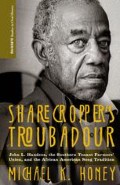Abstract
In Memphis, political boss E. H. Crump ruled with a repressive iron hand. Yet the police largely left the Southern Tenant Farmers Union office on Broad Street alone as long as it did not organize in the city (although the police took in H. L. Mitchell for questioning during the 1936 strike). The Hanrahan Bridge across the Mississippi River from Arkansas to Memphis functioned as a gateway to relative safety for many terrorized STFU members. “Union headquarters in Memphis are crowded with refugees from Arkansas,” according to the Sharecroppers Voice. Eliza Nolden (who would die from the beating she received in Arkansas) and the wife of Frank Weems and her eight children (who would later take sanctuary in Mississippi) all took refuge in a two-room shotgun shack with Rev. A. B. Brookins and his wife. Writing that he was still a “Socialist From My hart” at age 70, Brookins pleaded with Mitchell to put him back into Arkansas, where officers of the law had beaten and imprisoned him for 45 days and vigilantes had shot bullets through his home, grazing the hair of one of his children. Mitchell wrote to Brookins, “We have to use only the people who can do the work in the field that is needed and younger men who can dodge planters and don’t mind going to jail… I think too much of you to send you out in bad places.”1
We’re goin’to roll, goin’to roll, goin’to roll the union on, Goin’to roll, goin’to roll, goin’to roll the union on!.
—John Handcox
Access this chapter
Tax calculation will be finalised at checkout
Purchases are for personal use only
Preview
Unable to display preview. Download preview PDF.
Notes
James J. Fuld, The Book of World-Famous Music, Classical, Popular and Folk. New York: Crown Publishers, 1966, 435.
Evelyn Smith, H. L. Mitchell, Mean Things Happening in This Land: The Life and Times of H. L. Mitchell, Co-Founder of the Southern Tenant Farmers Union. Montclair, NJ: Allanheld, Osmun, 1979, 128.
Religious Folk-Songs of the Negro, As Sung at Hampton Institute, Nathaniel Dett., ed. (1927), 192–93.
Isaac Watts’s Hymns and Spiritual Songs (1707): A Publishing History and A Bibliography, ed. Selma L. Bishop (1974).
John W. Work, American Negro Songs and Spirituals, A Comprehensive Collection of 230 Folk Songs, Religious and Secular (1940), 80, 199, 249.
“Roll de Ole Chariot Along,” in R. Nathaniel Dett, Religious Folk-Songs of the Negro, Sung at Hampton Institute (1927), 192–193.
James Weldon Johnson, The Book of American Negro Spirituals (1925), 145.
Mark Fannin, Labor’s Promised Land: Radical Visions of Gender, Race, and Religion in the South. Knoxville: University of Tennessee Press, 2003, 175.
Rebecca B. Schroeder and Donald M. Lance, “John L. Handcox- ‘There Is Still Mean Things Happening’,” in Songs About Work: Essays in Occupational Culture for Richard A. Reuss, ed. Archie Green (1993), 184–208, 188.
Michael Streissguth, Johnny Cash: The Biography. Cambridge, MA: Da Capo Press, 2006, 36–38.
Jarod Roll, Spirit of Rebellion: Labor and Religion in the New Cotton South. Urbana: University of Illinois Press, 2010, 57–58, 60–61.
Bonnie Stepenoff, Thad Snow: A Life of Social Reform in the Missouri Bootheel. Columbia: University of Missouri Press, 2003.
John Wesley Work, Folk Song of the American Negro. Nashville: Fisk University Press, 1915, 23, 131.
Arthur Jones, Wade in the Water: The Wisdom of the Spirituals. Maryknoll, NY: Orbis Books, 1993, 23.
James Cone, The Spirituals and the Blues, An Interpretation. Maryknoll, NY: Orbis Books, 1972, 1991, 90–96.
Mark Fannin, Labor’s Promised Land: Radical Visions of Gender, Race, and Religion in the South. Knoxville: University of Tennessee Press, 2003, emphasizes how a grass-roots, radical Christianity gave the sharecroppers’ movement redemptive power that made it a profound social movement, chapter eight.
Alan Lomax, The Land Where the Blues Began. New York: New Press, 2002, 286.
Southern Tenant Farmers Union, The Disinherited Speak: Letters from Sharecroppers (ca. 1936), 16, American Radicalism Collection, Michigan State University Library.
Gellman, Erik S. and Jarod Roll, The Gospel of the Working Class: Labor’s Southern Prophets in New Deal America. Urbana: University of Illinois Press, 2011, 70–72.
General Correspondence, Tennessee, in microfilm, cited in Honey, Southern Labor and Black Civil Rights: Organizing Memphis Workers. Urbana: University of Illinois Press, 1993, 56–57.
William P Jones, “‘Nothing Special to Offer the Negro’: Revisiting the ‘Debsian View’ of the Negro Question,” International Labor and Working-Class History (Fall 2008), 217.
A. Dunbar, Against the Grain: Southern Radicals and Prophets, 1929–1959. Charlottesville: University Press of Virginia, 1991, 137–138.
Glenda Gilmore on Communist Party anti-racism in the South, Defying Dixie: The Radical Roots of Civil Rights, 1919–1950. New York: W.W. Norton & Co., 2008.
Journalist Mildred G. Freed “Ten Million Sharecroppers,” The Crisis (1939), reprinted in The Black Worker, vol. 7, Foner and Lewis, eds., 193–196.
Erik S. Gellman and Jarod H. Roll, “Owen Whitfield and the Gospel of the Working Class in New Deal America, 1936–1946,” The Journal of Southern History (May 2006), quote on 311.
Robert Koppelman, Sing Out, Warning! Sing Out, Love!: The Writings of Lee Hays (2003), 70.
Erik S. Gellman, Death Blow to Jim Crow: The National Negro Congress and the Rise of Militant Civil Rights. Chapel Hill: University of North Carolina Press, 2012.
Howard Kester, Revolt Among the Sharecroppers. Knoxville: University of Tennessee Press, 1997, 50.
Richard Wright, American Hunger. New York: Harper & Row, 1977.
Fannin, Labor’s Promised Land: Radical Visions of Gender, Race, and Religion in the South. Knoxville: University of Tennessee Press, 2003, 116–117.
Copyright information
© 2013 Michael K. Honey
About this chapter
Cite this chapter
Honey, M.K. (2013). Roll the Union On: Interracial Organizing in Missouri. In: Sharecropper’s Troubadour. Palgrave Studies in Oral History. Palgrave Macmillan, New York. https://doi.org/10.1057/9781137088369_6
Download citation
DOI: https://doi.org/10.1057/9781137088369_6
Publisher Name: Palgrave Macmillan, New York
Print ISBN: 978-0-230-11128-8
Online ISBN: 978-1-137-08836-9
eBook Packages: Palgrave History CollectionHistory (R0)

